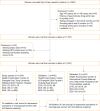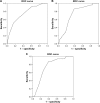Prediction of risk of depressive symptoms in menopausal women based on hot flash and sweating symptoms: a multicentre study
- PMID: 29200839
- PMCID: PMC5703159
- DOI: 10.2147/CIA.S148688
Prediction of risk of depressive symptoms in menopausal women based on hot flash and sweating symptoms: a multicentre study
Abstract
Objective: The present study aimed to develop a symptom-based (namely, hot flashes and sweating) scoring system for predicting the risk of depressive symptoms in menopausal women via a multicentre cross-sectional survey.
Methods: The data examined in the present study were obtained from 1,004 women aged 40-60 years who underwent physical examination at A Hospital. The basic information was obtained using a questionnaire-based survey. A self-rating depression scale was used to obtain the depressive symptom scores, while the Kupperman Menopausal Index was used to obtain the scores for the frequency of hot flashes and sweating. A logistic regression model was also established. The resulting β coefficient was employed to calculate and predict the risk of depressive symptoms in these women and a risk scoring system was established. The scoring system was validated using samples from 2 other centers (validation sample 1: B Hospital, 440 women; validation sample 2: C Hospital, 247 women).
Results: The scoring system developed to predict the risk of depressive symptoms in menopausal women was based on hot flash and sweating symptoms and associated with menopausal status, hot flash scores, education level (high school education and below) and being diabetic. The scoring system yielded a total score of 0-54 points. For women in the study sample, the area under the curve (AUC) of depressive symptom risk score was 0.750 (95% CI, 0.708-0.793). Validation sample 1 had an AUC of 0.731 (95% CI, 0.667-0.794), while validation sample 2 had an AUC of 0.744 (95% CI, 0.669-0.820). The optimal cut-off score to assess depressive symptoms in women participating in the present study was 31 points. The sensitivity and specificity for predicting depressive symptoms in the study sample were 0.667 and 0.701, respectively. In contrast, the sensitivity was 0.840 in validation sample 1 and 0.879 in validation sample 2.
Conclusion: The hot flash and sweating symptom-based scoring system developed to predict the risk of depressive symptoms in menopausal women relies on non-laboratory survey data. The system is simple, practical, and convenient to use. For Chinese huge population of menopausal women, the scoring system should be considered a reliable screening tool for depressive symptoms.
Keywords: depressive symptoms; hot flash; menopause; sweating.
Conflict of interest statement
Disclosure The authors report no conflicts of interest in this work.
Figures


Similar articles
-
Beyond frequency: who is most bothered by vasomotor symptoms?Menopause. 2008 Sep-Oct;15(5):841-7. doi: 10.1097/gme.0b013e318168f09b. Menopause. 2008. PMID: 18521049 Free PMC article.
-
A simple risk score based on sleep quality for predicting depressive symptoms in menopausal women: a multicenter study.Postgrad Med. 2018 Mar;130(2):264-270. doi: 10.1080/00325481.2018.1429792. Epub 2018 Jan 30. Postgrad Med. 2018. PMID: 29380646
-
Depressive symptoms and menopausal burden in the midlife.Maturitas. 2009 Mar 20;62(3):306-10. doi: 10.1016/j.maturitas.2009.01.002. Epub 2009 Feb 14. Maturitas. 2009. PMID: 19223131 Free PMC article.
-
Hot flash, hot topic: conceptualizing menopausal symptoms from a cognitive-behavioral perspective.Appl Psychophysiol Biofeedback. 2005 Mar;30(1):75-82. doi: 10.1007/s10484-005-2176-9. Appl Psychophysiol Biofeedback. 2005. PMID: 15889587 Review.
-
Menopausal symptoms in Hispanic women and the role of socioeconomic factors.Obstet Gynecol Surv. 2006 Mar;61(3):187-93. doi: 10.1097/01.ogx.0000201923.84932.90. Obstet Gynecol Surv. 2006. PMID: 16490118 Review.
References
-
- Hickey M, Schoenaker DA, Joffe H, Mishra GD. Depressive symptoms across the menopause transition: findings from a large population-based cohort study. Menopause. 2016;23(12):1287–1293. - PubMed
-
- Campbell KE, Dennerstein L, Finch S, Szoeke CE. Impact of menopausal status on negative mood and depressive symptoms in a longitudinal sample spanning 20 years. Menopause. 2016;24(5):490–496. - PubMed
-
- de Kruif M, Spijker AT, Molendijk ML. Depression during the peri-menopause: a meta-analysis. J Affect Disord. 2016;206:174–180. - PubMed
-
- Cohen LS, Soares CN, Vitonis AF, Otto MW, Harlow BL. Risk for new onset of depression during the menopausal transition: the Harvard study of moods and cycles. Arch Gen Psychiatry. 2006;63(4):385–390. - PubMed
Publication types
MeSH terms
LinkOut - more resources
Full Text Sources
Other Literature Sources
Medical

